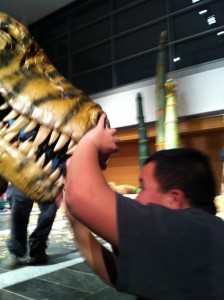 We went to the Friday evening show of The Dinosaur Petting Zoo at the Tilles Center last week. We had to get their early to pick up our tickets for the general admission show; showing up at 4pm for a 5pm show. When other families started arriving, my wife’s first comment was “uh oh, it’s a little kid’s show”. Indeed, the overwhelming majority of children showing up for this puppet show were under 8 years old. Mike, our youngest of three and bona fide paleontologist-in-training, is 12 years old.
We went to the Friday evening show of The Dinosaur Petting Zoo at the Tilles Center last week. We had to get their early to pick up our tickets for the general admission show; showing up at 4pm for a 5pm show. When other families started arriving, my wife’s first comment was “uh oh, it’s a little kid’s show”. Indeed, the overwhelming majority of children showing up for this puppet show were under 8 years old. Mike, our youngest of three and bona fide paleontologist-in-training, is 12 years old.
As if we didn’t have anything else to worry about with a child with Autism, having a child who literally towers over other children in a public venue is akin to putting a sign on his chest that screams “Look at me! I am different!” As much as parents with Autistic children will attest that they have developed thick skins, we yearn for times when our children blend in, if only for a scant minute or two. We are in fact okay with, and often celebrate our children’s unique traits and abilities, but are achingly aware of the public stigma of Autism.
Mike, as anyone who has ever met him will attest, knows everything there is to know about dinosaurs in general, and T-Rexes in particular. His room could be converted to a Jurassic Park gift shop if we ever needed a second income. His dinosaur-related DVD collection is better than most libraries. He knows how to find dinosaur toys, books, pictures and memorabilia on eBay, Amazon, Google, and lesser known websites. He has re-drawn the pages of a pirate book (“Captain Flinn and The Pirate Dinosaurs”) and replaced the human characters with his dinosaur toy friends (they each have a name, of course) with elaborate detail.
So we progress through the show, which ends with a volunteer from the audience being asked to the center of the stage. None of the ‘little kids’ want to come up; some take a step forward, but quickly run back to their moms and dads. There are three; perhaps four kids in Mike’s age group in the audience that still hesitate at what might be in store up on stage. Mike has his hand raised patiently, waiting and hoping to be picked. His eyes never waver from the emcee. There is no fear, nor trepidation; no anxiety which often destroys the public outings of many families affected by Autism. For that brief instant, he stood out in ways those other children could only aspire to: he was without fear, and for that, he blended right in with them as they screamed with glee.
As much as dinosaurs (and to a lesser extent, crocodiles and other toothy animals) are a major focus for Mike, he is progressing; becoming more conversational, empathetic, and academic. For this we thank the tireless work of his teachers, and his brothers, and everyone who has connected with him. This outing also taught my wife and me that Mike will continue to teach us things about ourselves, and we can’t wait for more of those lessons.









